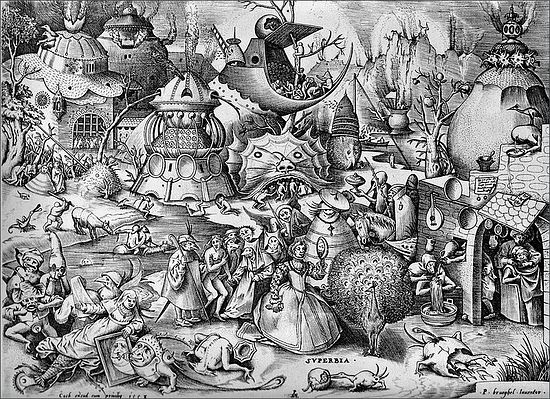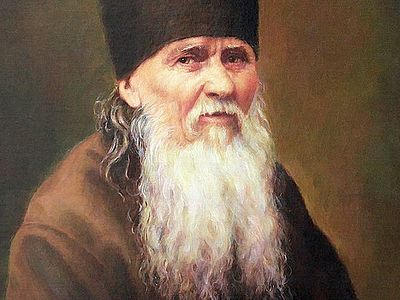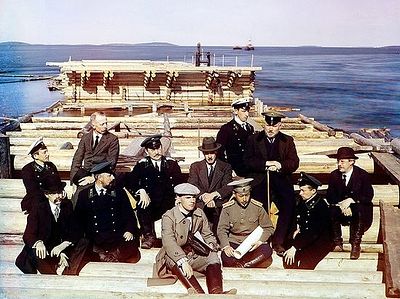In the world, pride and self-esteem are sometimes raised almost to the status of virtues or signs of the nobility of one’s nature. This view is erroneous and happens, according to the words of St. Macarius, “out of ignorance or from darkening by the passions.” The elder wrote to a spiritual child:
“In your previous letter you mention your self-esteem more than once and, as if you hold it in high regard, you show it off like some adornment.[1] You need to extirpate it from yourself by all means—it is the cause of all our evil and vices. Worldly people still regard it as a virtue and as nobility, and this is out of ignorance or from darkening by the passions; while we have to oppose it in everything by humility and selflessness.”
God resists the proud
Pride and vanity belong to the most dangerous passions. The Optina elders wrote much about the struggle with these passions. St.[2] Lev sorrowfully called vanity “the poison which kills the fruits of even the most ripened virtues.”
“This passion not infrequently extends from youth to old age and to the very grave. It pursues not only the passionate and prosperous, but sometimes also the perfect, and therefore no little caution is required. Only the passionless Creator can uproot it. Oh, how difficult it is to avoid this poison, which kills even the ripest virtues!”
St. Barsanuphius used to speak about pride as a demonic characteristic:
“God resists the proud, but giveth grace to the humble.[3] Why doesn’t it say that God resisteth lechers, or the envious, or someone else, but it says exactly, “the proud”? Because this is a demonic characteristic. A proud man becomes as if akin to a demon.”
St. Nikon cautioned:
“We should not be proud of our health, or beauty, or any other of God’s gifts… Everything earthly is liable to change: both beauty and health. We should thank the Lord, thank Him with humility, acknowledging our unworthiness, and not get conceited about something.”
St. Ambrose warned that nothing hinders progress in the spiritual life like pride and vanity, and the offspring of these passions are envy and hatred, anger and remembrance of wrongs:
“All of us suffer more often than not, more or less, from vanity and pride. And nothing hinders progress in the spiritual life like these passions. Wherever there is indignation, or disagreement, or dissent—if you look carefully it will turn out that the greatest part to blame for this is love of praise, and haughtiness.
That’s why the Apostle Paul gives us a commandment, saying, ‘Let us not be desirous of vain glory, provoking one another, envying one another’ (Gal. 5:26). Envy and hatred, anger and remembrance of wrongs are the common offspring of vainglory and pride.”
Vainglory and pride, although cut of the same cloth, have different effects and indications
St. Ambrose used to instruct people thus:
“Vainglory and pride are one and the same thing. Vainglory manifests its works, so that people see how you go along, how adroitly you do things, while pride then begins to disdain everyone. Vainglory is like a worm—at first it crawls and bends. But when it grows wings, it flies up high, and that is what pride is like.”
To show, however, how pride and vainglory differ from each other and how they effect a person, St. Ambrose even composed a story about ducks and geese, personifying these passions. The story was occasioned by a rug given to the starets with pictures of ducks:
“Not long ago they gave me a carpet on which ducks were beautifully depicted. I felt sorry that they didn’t think of putting geese there, too, since there was still a lot of room left on the carpet. Such a thought came to me because the characteristics and actions of ducks and geese portray the characteristics and actions of the passions of vainglory and pride very well.
Vainglory and pride, although cut of the same cloth, have different effects and indications. Vainglory tries to catch people’s praise and for this often abases itself and engages in flattery, while pride breathes arrogance and disrespect to others, although it also loves praise.
A vain person, if he has a good-looking or handsome appearance, preens himself like a drake and glories in his beauty, although he is often awkward and clumsy as a duck. But if one who is conquered by vainglory doesn’t have a good-looking appearance or other good qualities, then to impress people and get praise he flatters, and like a duck cries, “That’s right! That’s right!” when in fact in all fairness it isn’t always so, and he himself often is inwardly disposed otherwise, but out of cowardice just becomes a yes-man.
When something is not just as he likes, a goose lifts his wings and cries, “Honk-honk!” So also the haughty person, if he is of some of importance in his circles, often raises his voice, shouts, argues, objects, and insists on his own opinion. But if the one suffering from pride has no kind of weight or importance in his situation, then out of the anger inside him he hisses at others like a goose sitting on her eggs, biting whoever she can…”
What are you so proud about?
Many, many people have nothing to be proud about at all. In this connection St. Ambrose shared the following story:
“A certain woman told her father-confessor that she was proud. “What are you so proud about?” he asked her. “Are you famous?”
“No,” she answered.
“Talented?”
“No.”
“So, you must be rich?”
“No.”
“Hmm… In that case, you can be proud,” said the confessor in conclusion.
“There is nothing to become conceited about: God gives the word. A person on his own is not able to say a good word. Every good word is from God. It says, “Not unto us, O Lord, not unto us, but unto Thy name give glory” (Ps. 113:9 LXII).
Showing that there is nothing for a person to be proud about, the elder added:
“Just what does a person actually have to be proud about? A ragged, wretched person asks alms: “Have mercy, have mercy!” But whether mercy will be given, who knows yet?”
How to determine the signs of humility or pride in yourself
St. Macarius wrote about the main signs that humility or pride is present in a person:
“Let the following be for you a sign of humility or pride: the latter blames, reproaches, and sees blackness in others, while the former sees only his own bad state and doesn’t dare to judge anyone.”
St. Anatoly (Zertsalov) taught his [spiritual] children that sometimes being excessively upset about something also gives secret vainglory away:
“You’re afraid when you sing—out of vainglory. There is a lot of that in you.”
Sorrow is God’s punishment to the proud
St. Lev used to warn about the fact that proud people suffer various calamities:
“If you don’t put the blame on yourself, you won’t cease to live in misery, bearing the sorrow of God’s punishment to the proud.”
It is very difficult to rid oneself of pride
It is very difficult to rid oneself of pride. If a person thinks that he is already free from pride, that he has already attained humility, then, in the words of Elder Macarius, it obviously proves his pride:
“In your letter you called yourself humble (of course, that is out of ignorance), but you have still not reached the point of being humble. If we acquired this wealth, then we could easily attain all the virtues as well. Yes, it alone without the other virtues can save us, but the virtues without it, on the contrary, bring no benefit at all. He who has acquired humility has acquired God. This is all the teaching of that great man, St. Isaac.
So you shouldn’t think that you are humble, but if you think you are, then you obviously are showing your pride.”
St. Ambrose used to say:
“Three little rings are hooked to each other: hatred to anger, and anger to pride.”
“Vainglory doesn’t give a person any peace, inciting him to jealousy and envy, which makes him upset, raising in his soul a storm of thoughts.”
“You stare—and from this comes thoughts, first vainglorious, and then also bad ones. Hold your head down—like that, don’t stare at people.”
And St. Macarius used to warn that the passions gain strength from pride, while humility, on the contrary, dethrones the passions:
“But you must know that all the passions gain the strength to conquer us from our pride, while, on the contrary, humility dethrones them.”
Pride alone can replace all the other passions
It happens that pride is so great in a person that the other passions subside. St. Macarius gave this guidance:
“One passion reproaches another: where there is self-esteem, avarice gives way—and it happens the other way around. We know, though, that sometimes all the vices leave a person, and only one remains with him—pride.”
Such a person may outwardly behave himself irreproachably and look at other people who suffer from drunkenness or smoking or other passions with disdain. But there is such arrogance and self-admiration in this outwardly blameless person’s gaze, such inordinate praise of his virtues, that his pride alone is enough for his soul to perish. The elder warned:
“It happens, however, according to the word of St. John of the Ladder… that all the passions withdraw from certain people except pride alone, which replaces all the other passions, and that is why we have to be careful that instead of bearing fruit we don’t bring weeds.”
How to fight with these passions
St. Macarius advised that, when fighting thoughts of conceit and pride, we should not be embarrassed to reveal them in confession:
“About the fact that they find haughty thoughts, they must reveal them and not be embarrassed.”
St. Hilarion instructed that at the appearance of thoughts of vainglory and praise of ourselves to remind ourselves that the main thing is humility, and here that’s just what we don’t have. And the first proof of this fact is precisely the thoughts of vainglory that are coming to us:
“Cut off thoughts that praise us and thoughts of vainglory by the fact that the most pleasing thing of all to God is humility, but you don’t have it; which means that you don’t have anything good. That’s what to do correctly—what you must do.”
Elder Joseph taught that when thoughts of vainglory appear we should remember our sins:
“And when vainglory rises up, it’s not a bad thing to remember some little sin that reproaches you.”
And Elder Ambrose used to give the following advice:
“If you answer vainglory with the remembrance of your sins and laziness, then you will see that there is nothing to boast of.”
The saint used to say:
“Man is like grass. Whoever is haughty will wilt like grass, but whoever fears God will be shown mercy by the Lord.”
“We should look downwards. Remember: ‘Dust thou art and unto dust shalt thou return.’”
“When pride attacks, say to yourself: ‘An odd woman is walking around.’”
The starets used to advise:
“When vainglory comes, pray like this: ‘Lord, from my secret sins cleanse me, and from those of others spare Thy servant.’”
Sometimes a person tries to rid himself of thoughts of pride and vainglory with all his might, but can’t succeed at all. Concerning this, St. Ambrose wrote:
“The enemy’s din continues to annoy you, and the enemies contrive in every possible way to wound your soul with the arrows of pride and conceit.”
In such a case, the elder advised first of all to examine one’s emotional disposition:
“First of all take a look at your emotional disposition—whether you are at peace with everyone, whether perhaps you aren’t judging someone.”
The saint wrote to his spiritual child:
“Pray with humility to God with the words of the Psalm: ‘Who can understand falls into sin? From my secret ones cleanse me and from those of others spare Thy servant.’ All the holy fathers have a unanimous answer and counsel in such cases: in any case of temptation, the victory is humility, self-reproach and patient endurance—of course, by asking these things from above. Pray about this both to the Queen of Heaven and to all the saints who have been pleasing to God—whoever you have special faith in—that they would help you rid yourself of demonic delusion.”
“Our self-esteem is the root of all evil. It is the beginning of all passions; it is the cause of all our misfortunes and suffering—sometimes in the present, but sometimes as a consequence of previous mistakes…The battle-axe for eradicating the roots of self-esteem is faith, humility, obedience and the cutting off of all one’s desires and opinions.”
Labor and sorrows can also overcome pride. St. Ambrose used to say:
“One has to labor much, and get many wounds in order not to perish from pride. When they don’t touch us or push us, pride lives in us to the end of our lives.”
Pride is hidden in the very desire to quickly ascent to the height of virtue
Pride and vainglory can be hidden in our very desire to instantly rid ourselves from passions, to quickly ascend to the height of virtue. In this, according to the words of St. Lev, is hidden spiritual pride:
“Desiring to please God, you wish to quickly ascend to the height of the virtues and imagine this to be possible for you, which clearly demonstrates spiritual pride in you (which you yourself also acknowledge)…”
But humility well knows that “virtue is not a pear; you can’t eat it up all at once.”
“From my secret sins cleanse me, and from those of others spare Thy servant” (Ps. 18:13-14 LXX).
Our holy Fathers, elders of Optina, pray to God for us sinners!





